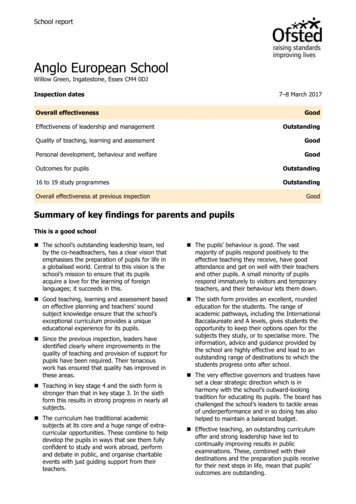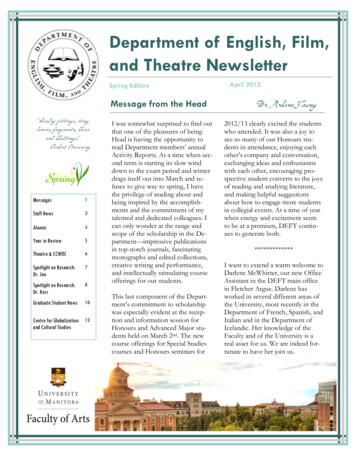
Transcription
Anglo European SchoolBehaviour Policy(Including Drugs Policy)PolicyReceived/first oved * by LeadershipTeamRatified/Reviewed* by GB iewed by FGBPublished to Governor’s area onWebsitePublished in schoolPlanned review date if anyReviewedMay .201908.10.1921Biennial
Contents1. Rationale2. Roles and Responsibilities3. Aims and Objectives4. Communication of the policy5. Partnership with parents and the home including home/school agreement.6. Rewards and Awards7. Legal framework8. Monitoring, Evaluation and Review9. Attendance10. Strategies for Implementing the Behaviour Policy11. Anti-Bullying and pupil support systems12. Managing pupil transition13. Staff development, support and managing malicious accusations againstschool staff14. Appendices: Anglo AgreementHome School AgreementReferral Room Procedure
1) RationaleAnglo European is a mainstream comprehensive school with an international ethos;we have a rich diversity of cultures, languages and backgrounds and we believe thathigh standards of students and staff behaviour, respect for each other and supportiveworking relationships are essential for effective teaching and learning. We seek topromote inclusive, stimulating learning environment where students can take riskssafely, learn self-discipline, personal responsibility, respect for authority, high selfesteem and a pride in their school. We aim to promote fairness, equality and anenvironment free from intimidation, bullying and violence and disruption to learning.We aim to create a positive relationship between staff, students and parents;promoting praise and encouragement and working in partnership to achieve maximumstudent progress.This policy applies to all students on school site, including visiting students and the 6thform, although we have high expectations that our 6 th formers will manage theirbehaviour effectively without the need for many of the sanctions identified here.2) Roles and ResponsibilitiesAll members of the school community are expected to uphold the Behaviour Policyand the Anglo Agreement. All staff take responsibility for promoting good behaviour,rewarding achievement and sustaining a positive attitude and a conducive learningenvironment which is safe and orderly. Courtesy and respect is expected from allstaff, parents and students.The Governing Body are responsible for establishing, in consultation with the seniorleadership team, a policy for behaviour and discipline and review this according to thepolicy review schedule. They will communicate this to parents, staff and students viathe school website, ensure it is non-discriminatory and clear.The Headteachers will implement the policy on a day to day basis and ensure it isfairly applied by staff.Staff, including professional support staff and volunteers will be responsible forapplying the policy fairly and consistently and to support each other in doing so.Parents and carers will be expected, encouraged and supported to work inpartnership with the school to assist it to maintain high standards of behaviour andtake responsibility for the behaviour of their child, both in and outside school,upholding the policy and promoting good behaviour by supporting any sanctionsapplied and praising students for their achievement and good behaviour.Students will be expected to take responsibility for their own behaviour; creating apositive social learning environment and reporting any undesirable behaviour. Theywill be made aware of policy, procedures and expectations.Page 1
3) School Aims and Ethos:Objectives: Page 2To develop positive relationships between students, staff and parents based onmutual understanding.To foster student self-confidence, self-esteem, well-being and happiness inschool and beyond.Create a learning environment which is safe, purposeful, mutually supportiveand non-threatening.To create a social environment which is relaxed, friendly and non-threatening.Provide opportunities to reward responsible behaviour and good citizenshipTo prepare students for their place in a global, democratic society where theyknow their rights and understand their responsibilities in it.To help students recognise the impact of good behaviour, respect andpoliteness in their homes, local community and school environment.Promote good working partnerships with parents to encourage them to takeresponsibility for their child’s behaviour, support them with advice and guidanceand keep them informed about their child’s behaviour and progress in school.
4) Communication of the policyThis policy is published on our school website and a paper copy is available on request fromthe school office. The home school agreement, Low Level Disruption (LLD) policy and AngloAgreement are displayed in every classroom and in the school organiser. It is reviewedannually.5) Partnership with parents and the home/school agreement. (see appendices)The standard of behaviour expected of all pupils is included in the school’s home-schoolagreement which parents are asked to sign following their child’s admission to the school.Parents are involved in supporting the school’s implementation of the behaviour policy andsupporting rewards and sanctions. Parents will be informed of any detention or more serioussanctions being set and will be expected to attend any meetings relating to reintegrationfollowing exclusion or any matters deemed of a serious nature in a timely fashion where keymessages can be reinforced. Parental permission is not required for sanctions but the schoolwill always endeavour to give at least 24 hours’ notice for detentions. For very unavoidablecircumstances, the parent can ask for the date of the detention to change but cannot requirethis to happen.Parents need to take responsibility for their children’s conduct on social media out of schoolhours. The school reserves the right to get involved if the smooth running of the school isaffected or there is an on-going threat to any student or member of staff. (see e-safetyPolicy)The Home/School AgreementThis sets out the standards of behaviour expected of all students and the responsibility ofparents to work with the school to support the behaviour policy, sanctions and rewardssystems in supporting the school maintain outstanding behaviour and safety. Parents mustsign this on admission to the school.6) Rewards and AwardsAt Anglo European, we believe in encouraging and rewarding effort and achievement.Students are congratulated on their achievements continuously through our assemblies,newsletters, tutor time and in lessons by their teachers. For specific achievements theyreceive e-rewards through SIMS and are encouraged to engage with all the opportunitiesavailable to achieve them. These e-rewards motivate students to achieve their personal bestand to be rewarded for it.Students can achieve rewards for:Curriculum/Teacher Rewards Sustained improvement against targets Outstanding work/effort at any given level An outstanding classwork/homework which exceeds expectation Outstanding participation in a lesson Supporting others’ learning Outstanding effort in the completion of workTutor Rewards:Page 3
Taking responsibility for a new studentSustained effective use of the organiser, including the recording of homeworkVolunteering to help or undertake additional duties in support of the tutorPreparation for and sustained hard work in a tutor periodCommunity: Supporting school events Involvement in extra-curricular activities /participation in a school team event Active Citizenship Nominated for an award Supporting the local community Yearly achievement of diplomaIn KS3, 10 commendations for Mathematics, English, Science, PE, Tutor time andLanguages and 5 e-commendations for Geography, History, RS, Technology, ICT,Citizenship, Art, Music, Drama and Community triggers an automatic postcard home toparents congratulating the students on their achievements in this area. In KS4, 5commendations in every subject triggers a postcard home.The 10 students in each year group receiving the most postcards in a term receives aDeputy Headteachers’ certificate and the student with the most awards each term receivesthe Headteachers’ Certificate and letter of commendation. All senior staff may issue lettersof commendation where they feel students have earned this.Subject Awards: These awards are considered when nominating students for specialawards at KS3 and KS4 Awards evenings. Students are nominated by each subject area forachievement and progress awards. Students nominated in three or more subjects receiveYear leaders’ awards and the student who achieves the most subject nominations receivesthe Headteachers’ Award.In KS3, the student who has made an outstanding contribution to the school and its ethosreceives the Outstanding Contribution Award, Community Award or the International Award.There is also a Headteachers’ Award presented to the student who has made the mostoutstanding progress.In KS4, The Rotary Young Leaders’ Award is given to the student who has overcome someadversity to contribute significantly to the community. The Richard Pain Award is presentedto the student who has most prominently supported school/community relations and theGovernors’ Award is given to the student who has made a significant contribution to theschool’s public reputation through academic, sporting or charitable work. The Bob Reedaward is given to the student who has most significantly promoted the international ethos ofthe school. The Victrix /Victor Ludorum is given to the boy/girl accumulating the most pointsat Sports Day.These awards are published on our honours boards in the school hall.Our Eisteddfod is a competition which involves students competing in the arts includingmusic, drama, dance and performance poetry (including in another language). Severalawards are given at the final performance including the Eisteddfod Palm D’Or for the bestoverall performance.Page 4
Jack Petchey: We also run the Jack Petchey Achievement Award where staff, students andparents can nominate a student for doing something outstanding. These award winners aregiven a certificate and money to donate to a particular project at school.Student Representatives/Student Executive Posts: Students are recognised for theircommitment to the school and its ethos by being elected as representatives in democraticelections organised by the student voice and executive.7) Legal Framework:The Headteachers set out measures which aim to: Promote good behaviour, self-discipline and respect Prevent bullying Ensure that students complete assigned work Regulate the conduct of studentsThe Headteachers take into account any guidance or notification provided by the governingbody including in relation to screening and searching students, the power to use reasonableforce and other physical contact, the power to discipline beyond the school gate, when towork with external agencies to support students who are continuously disruptive and thepastoral care of staff accused of misconduct.The Headteachers decide the standards of behaviour expected of students, determine theschool rules and any disciplinary measures for breaking the rules. They must publish thepolicy to parents, staff and students via the school website.Out of School BehaviourTeachers’ power to discipline includes the power to discipline students even when they arenot in school or in the charge of a member of staff. The Anglo European is committed toensuring that our students are positive ambassadors for the school. In addition to schoolactivities during the school day, staff can challenge any misbehaviour when a child is: Taking part in any school-organised or school-related activity e.g school visits andexchanges. Travelling to or from school Wearing a school uniform Behaving in some way that identifies them as a student at the Anglo European Behaving in a way that could have repercussions for the orderly running of the school Behaving in a way that poses a threat to another student, themselves or a member ofthe staff or public Behaving in a way that could adversely affect the reputation of the school.Therefore, we expect good, orderly and courteous behaviour on all transport (see makingTravel Safer Policy), educational visits or learning opportunities off school site. We expectstudents to engage in behaviour which does not pose a threat to the health, safety or welfareof other students, staff or members of the public and that protects the reputation of ourschool.Screening, Searching and ConfiscationThe Headteacher or authorised staff can search a student or their possessions (includingblazers, pockets, lockers and bags) without consent where they have reasonable grounds forsuspecting that the student may have a prohibited item. Prohibited items include knives orweapons, alcohol, illegal drugs or paraphernalia, stolen items, tobacco and cigarette papers,E Cigarettes, fireworks and pornographic images.Page 5
School staff can confiscate any item found which they consider to be prohibited, harmful ordetrimental to school discipline.Mobile phones must be switched off when in a student’s possession. If mobile phones aremisused they will be confiscated and held in the school safe located in Student Services andcan be returned at the end of the school day. Students should contact the Pastoral Manageror Year Leader at 3.30pm to arrange collection. A detention will be issued as a result.In the event of the need for an urgent phone call to be made, students can report to StudentServices where appropriate calls can be made.Prohibited items of clothing can be confiscated such as jewellery and hoodies. Items ofclothing will be held in the Student Services. Hoodies will be returned at the end of the dayand jewellery at the end of the term.Staff are not liable for any damage or loss arising as a result of confiscation. Items otherthan mobile phones are returned to either students or parents at a time agreed by theteacher concerned.Use of Reasonable ForceWe acknowledge our duties under the 2006 Education and Inspection Act in which all schoolstaff have the legal power to use reasonable force to prevent students committing a criminaloffence, injuring themselves or others, damaging property or to maintain good order anddiscipline amongst students. We do not expect staff to do this unless they feel comfortableand will not direct staff to do so. However, all staff will be supported where reasonable forceis deemed appropriate. If reasonable force has been used, the parent will be informed of thelevel of risk, degree of force and effect on the pupil and member of staff.Equal OpportunitiesAnglo European School acknowledges its legal duties under the Equality Act 2010 and inrespect of students with Special Educational Needs and Disabilities.8) Monitoring and ReviewThe school will review this policy in accordance with the policy review schedule. Theeffectiveness of the policy will evaluated through analysis of statistic evidence (ReferralRoom, detention, exclusions, LLD etc), surveys to parents (via Parentview), staff, studentsand Leadership Team, through department reviews and other monitoring systems, theHeadteachers’ report to governors and through external inspection (e.g Ofsted)9) Attendance: (please see Attendance Policy)Attendance and punctuality are used in making judgements about behaviour and safety.Students should be aiming for 100% attendance which gives them the best opportunity toachieve their potential. If attendance drops below 95% parents are informed and attendanceis more closely monitored – refer to attendance policy for further details.Good punctuality is also an important factor and students with a poor track record will besupported to improve. Persistent poor punctuality results in notification to parents in writing,monitoring by the form tutor, school based sanctions and may lead to a parental meeting,Year Leader detentions and Year Leader or Senior Leader reports depending on the level ofseverity. Where there is a real concern with regards to a child’s attendance outside agenciesmay be referred to, including the Attendance Compliance Team (ECC).Page 6
Absence will not be authorised in school term time unless in very exceptional circumstancesand holidays will not be approved. Parents should apply using the leave of absence formwhere they want this to be considered.The Assistant Headteacher (Achievement) is responsible for monitoring attendance andpunctuality and is supported in doing this by the Attendance Officer, Attendance Assistant,Senior Year leader and Year Leaders. Regular reports are issued to Year Leaders, tutors andleadership team.Telephone calls are made home on the first day of absence if a parental call has not beenreceived to report a reason for the absence. Persistent absence can result in a parentalmeeting, referral to the Attendance Compliance Team (ECC) which may result in fixedpenalty notices and possible prosecution.10) Strategies for Implementing the Behaviour Policy (Rules & Sanctions)Disciplinary Strategies: Sanctions:Sanctions can be applied by any teacher or professional support staff authorised by theHeadteacher. The sanction must be taken on the school premises (or on a school visit)under the charge of the member of staff. It must be proportionate and reasonable to thebehaviour and circumstances.Classroom management & behaviour in lessonsAll classrooms have an Anglo Agreement which outlines the expectations of behaviour forthe classroom. This is also published in the staff handbook, the student planner and theparent handbook for new parents. All students are expected to respect their own and othersright to learn. This involves arriving to lessons on time, being prepared with the rightequipment, demonstrating a positive attitude to learning and not disrupting the teaching andlearning in any way.Behaviour outside the ClassroomStudents are expected to behave in a manner which shows respect to themselves andothers. They are to use appropriate language and show courtesy and consideration forothers. They should respect the environment and move around the school in a manner whichrespects the health and safety of others. They should wear the correct uniform; the schoolreserves the right to correct inappropriate use of items of uniform by contacting parents,removing students from circulation at social time and using Year Leader detention ifbreaches of uniform cannot be corrected by students and becomes a persistent issue.If students wish to wear religious articles in school they should seek permission to do so inwriting from the Headteacher. This avoids potential confrontation with teachers who maychallenge items of jewellery normally in breach of the uniform policy.If an incident occurs outside the lessonIt is the responsibility of the Year Leader to deal with incidents and issue appropriatesanctions. The school also employs midday supervisors and Study Club supervisors atlunchtimes to support student well-being. They can make a referral to the Year leader or asenior manager if the incident is of a serious nature and requires immediate attention. Alunchtime duty rota exists for senior staff for this purpose. Year leaders and senior staff willfeedback the outcomes of incidents to lunchtime staff and support the student in making thesituation right by apologising, issuing sanctions etc.If an incident occurs in a lesson:It is the responsibility of the teacher to ensure completion of work and effective behaviour forlearning is maintained. Sanctions applied in the classroom can include: a verbal reprimandor advice on how to behave, time out to calm and reflect, re-doing work to a better standard,Page 7
removal from the lesson to work elsewhere in the department or in the referral area for highlevel disruption. Teachers can refer a student for department detentions or low leveldisruption detentions (see LLD)If the behaviour is persistent in the subject, teachers can refer the student to their Head ofDepartment to be placed on a subject report.D DutyThe system of D Duty involves senior staff being on call for each teaching period and availableto support teachers should they be needed. Its primary purpose is to enable teaching andlearning to continue in the event of persistent low level disruption or an incident of high leveldisruption.If, in the opinion of the class teacher, they feel they need support they should follow thefollowing procedure. Activate local department procedures if any have been agreed. Thismight involve calling on a colleague in an adjacent room, a colleague who is allocatedDepartmental Support time at the time of the incident:1. If appropriate, give warnings that D Duty is to be called.2. Call someone in the main office on 1970, 1902, 1903, 1904, 2011, 1901 (in that order),if this is not possible then send a sensible student to the main school office or studentservices.3. If appropriate, ask the student to stand outside in a position where they cannot see intothe classroom.4. On arrival the D Duty teacher will require a verbal report on the incident. This may begiven in the classroom or outside. This may or may not be in the presence of thestudent concerned.5. At that point the D Duty teacher will ask the class teacher what they would like tohappen:a. Remove the studentb. Ask if, or suggest that the student remain in the class. In many cases the veryact of calling the D Duty teacher may have resolved the problem.c. Invite the class teacher to report any further misdemeanours to her/him at theend of the lessons.d. D Duty may agree to return later in the lesson if possible.6. If removed, the class teacher will usually be asked to set work.7. In most cases, the student(s) will then go to their next lesson. However, it may not beappropriate for the student to return to that teacher’s lesson for an agreed number oflessons.8. During the removal period the student(s) will be required to complete a Student IncidentRecord (yellow).9. The D Duty teacher and HOD will receive a report from the teacher within 24 hours orsooner if the matter is serious enough.10. The report and the Student Incident Record will be forwarded to the relevant Head ofDepartment and, in more serious incidents, the senior link as well.11. If the D Duty teacher feels the incident could have been managed more effectively, thiswill be fed back to the Head of Department.12. D Duty call outs are logged and monitored.Page 8
NOTE: There may be occasions when a D Duty teacher is required in two or more placessimultaneously. In such cases, every effort will be made to find another senior colleague.Referral Room:If students need to be removed from a lesson they will be placed in the referral room. Mobilephones will be confiscated and work is set to be completed independently. Only senior staffcan place students in the referral room. A log of students attending the referral room is keptand monitored. Following removal from a lesson, the senior member of staff will support thestaff member, supported by the Head of Subject to reintegrate the student back into futurelessons using restorative justice methods. (see Appendix 1 – Procedure for Referral Room)Recording of Incidents:Students involved in incidents will be required to complete a student statement form. If theyhave difficulty with writing, this may be a verbal statement which is then recorded by theteacher and signed by the student. The outcome of these incidents are recorded on SIMS.DetentionsDetentions are an important sanction. Whilst parental permission is not required, the schoolseeks to give parents at least 24 hours’ notice. Providing the Headteachers are satisfied thata detention is justified, parents and carers cannot refuse for their child to attend a detention.It is the responsibility of parents and carers to arrange the safe travel home of their child whohas served an after –school detention. The school cannot sanction detentions beingpostponed or re-arranged on the grounds that parents cannot fulfil their responsibility fortravel home. This is made clear in our Home/School Agreement which every parent andstudent agrees to.1)Detention TypesDetention TypeAdministered ByLow Level Disruption(LLD)AHT/Senior YearLeaderSubject DetentionYear Leader DetentionSchool DetentionExtended SchoolDetentionInformation½ hour in lengthSet by the teacher after 3rdwarning and recorded in organiser.Supervised by senior staffHODs /SubjectAfterschool for one hour,Leaderssupervised by subject staff.Senior Year Leader Thursday evening for one hoursupervised by Year LeadersSenior StaffFriday evening for one hourSupervised by senior staff.DeputyFriday evening for 90 minutes forHeadteacherpersistent offendersLow Level Disruption:Low level disruption could be defined as being late without reason, missing essential basicequipment, talking when you should be listening, calling out inappropriately, answeringback/arguing, interfering with others’ possessions, eating, drinking (other than water),drawing graffiti or creating an inexcusable mess. Students are given a series of warnings:Page 9
1st incident2nd incident3rd incident4th incidentFirst warning.Second warning.Detention 12.30-13.00 / 13.30-14.00D Duty called, Detention 12.30-13.00 / 13.30-14.00 Phone call home/All cases from here are recorded by the Achievement team on SIMS.Parent communication:5 detentions set – Year Leader intervention and parents contacted via email10 detentions set – Year Leader intervention and parents attend a meeting at school to seethe Assistant Headteacher (Achievement)Missed LLD detentions:Students are set Department or Year Leader detention.Persistent offenders:Monitored by AHT (Achievement) and Year Leaders using PAUL report: Persistent LLDoffenders will be collected by Pastoral Manager just before lunch and put into the referralroom for whole of lunch time. A letter will be sent home and a list of offenders is kept andmonitored.LLD ReportsIssued with each PAUL reportTeacher Led Detentions:These can be set at the discretion of the teacher as a first response to poor behaviour. Thiswill be supervised by the teacher setting the detention and the Head of Department isinformed.Department Detentions:These are organised on a rota to avoid clashes. Detentions are supervised by members ofthe department assigned by the head of Department, who issue the detentions.Year Detentions:These arise from issues including uniform, lateness, behaviour outside the classroom. Theseare issued and supervised by the Year Leaders on a rota system very Thursday evening for40 minutes.School Detentions:Arise from issues which have failed to be resolved by Heads of Department or Year Leadersor incidents dealt with directly by senior managers. These take place on Friday for one hour.Note: the school does not need the permission of parents to issue detentions. TheHeadteacher, however, is required to ensure detentions are set consistently and fairly. Theschool will always endeavour to set detentions with the support of parents and with 24 hours’notice.Reports:Reports are a short term device used to monitor students whose behaviour is causingserious concerns. There are staged reports:Page 10
Self-Monitoring Report:Form Tutor ReportYear leader reportDepartment reportSenior leadership Team ReportIndividual Behaviour Plans (IBP) monitored by Assistant HeadteachersPastoral Support Programme (PSP monitored by Deputy Headteachers/HeadteachersParents are always informed that students are being placed on report and are expected toread and sign/comment on the outcomes daily.Individual Behaviour Plans (IBPs):Pupils on IBPs are monitored by the AHT (Achievement) in liaison with the Year Leader andteaching staff for 8 weeks. Students on IBPs report to an Assistant Headteacher daily. TheIBP is created through a meeting with the student and parents where three clear targets areset. These are reviewed through liaison with teachers and culminates in a review meetingwith parents where a student can be removed from the IBP, some progress can be madeleading to targets being adjusted and further review period set or if little or no progress hasbeen made, the student will fail the IBP and progress to a Pastoral Support programmemonitored by a Deputy Headteacher. The Assistant Headteacher should keep regularcontact with parents about their child’s progress.Pastoral Support Programmes (PSP):These are used when all other strategies have failed and a pupil is therefore facing the riskof exclusion. They are initiated by the AHT (Achievement) in liaison with the DeputyHeadteacher who is to monitor the student concerned. An initial meeting takes place withthe Headteacher, Deputy Headteacher, parent and student. A period of 16 weeks with a midterm review after 8 weeks of support strategies, monitoring and a daily report to the DHTculminates in a review meeting with the DHT, AHT (Achievement), parents and student. Iftargets have been met, they return to IBP. If targets have not been met they are referred tothe Headteacher for possible permanent exclusion. The Deputy/Headteacher Headteachershould keep regular contact with parents about their child’s progress.Children’s Support Service (CSS):This is a short stay provision which accepts referrals from local schools and the localauthority. CSS provide education and support children through individually-tailored learningprogrammes in positive, safe and caring environments. Children living in Essex can bereferred to CSS, those living outside of Essex can be referred to their LEA provision.Managed Move:This can be a supportive means of giving students a fresh start and another chance whenfacing permanent exclusion. Managed moves are arranged by senior staff in the homeschool with senior staff or Behaviour and Attenda
Anglo European is a mainstream comprehensive school with an international ethos; we have a rich diversity of cultures, languages and backgrounds and we believe that . Technology, ICT, Citizenship, Art, Music, Drama and Community triggers an automatic postcard home to parents congratulating the students on their achievements in this area. In .










